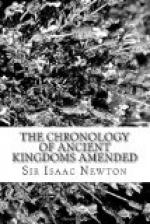As for the Chronology of the Latines, that is still more uncertain. Plutarch [18] represents great uncertainties in the Originals of Rome, and so doth Servius [19]. The old Records of the Latines were burnt [20] by the Gauls, an hundred and twenty years after the Regifuge, and sixty-four years before the death of Alexander the great: and Quintus Fabius Pictor, [21] the oldest Historian of the Latines, lived an hundred years later than that King, and took almost all things from Diocles Peparethius, a Greek. The Chronologers of Gallia, Spain, Germany, Scythia, Swedeland, Britain and Ireland are of a date still later; for Scythia beyond the Danube had no letters, ’till Ulphilas their Bishop formed them; which was about six hundred years after the death of Alexander the great: and Germany had none ’till it received them, from the western Empire of the Latines, above seven hundred years after the death of that King. The Hunns, had none in the days of Procopius, who flourished 850 years after the death of that King: and Sweden and Norway received them still later. And things said to be done above one or two hundred years before the use of letters, are of little credit.
Diodorus, [22] in the beginning of his History tells us, that he did not define by any certain space the times preceding the Trojan War, because he had no certain foundation to rely upon: but from the Trojan war, according to the reckoning of Apollodorus, whom he followed, there were eighty years to the Return of the Heraclides into Peloponnesus; and that from that Period to the first Olympiad, there were three hundred and twenty eight years, computing the times from the Kings of the Lacedaemonians. Apollodorus followed Eratosthenes, and both of them followed Thucydides, in reckoning eighty years from the Trojan war to the Return of the Heraclides: but in reckoning 328 years from that Return to the first Olympiad, Diodorus tells us, that the times were computed from the Kings of the Lacedaemonians; and Plutarch [23] tells us, that Apollodorus, Eratosthenes and others followed that computation: and since this reckoning is still received by Chronologers, and was gathered by computing the times from the Kings of the Lacedaemonians, that is from their number, let us re-examin that Computation.




